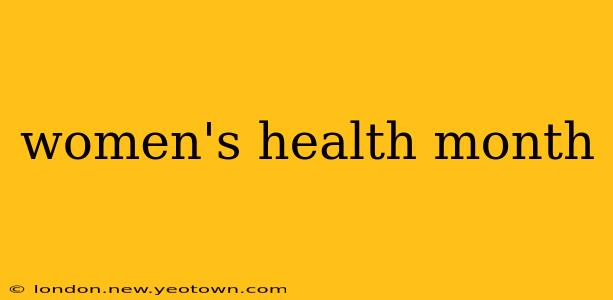May is Women's Health Month, a time dedicated to raising awareness about the importance of women's physical, mental, and emotional health. It's a month for celebration, reflection, and a powerful call to action – a reminder that prioritizing our well-being is not selfish, but essential. This isn't just about doctor's appointments and check-ups; it's about nurturing a holistic sense of self-care that empowers us to live our lives to the fullest.
My journey to understanding the profound importance of women's health began unexpectedly. Years ago, I was juggling a demanding career, family responsibilities, and the relentless pressure to "do it all." I prioritized everyone else's needs, consistently putting my own health on the back burner. The consequences? Burnout, a depleted immune system, and a concerning lack of energy. It was a wake-up call that forced me to confront my neglectful approach to self-care. This experience ignited a passion to learn more about women's health and share that knowledge with others.
What are the common health concerns for women?
This is a crucial question, and the answer isn't simple. Women's health concerns vary widely depending on age, genetics, lifestyle, and overall health. However, some prevalent issues consistently emerge. These include:
-
Reproductive Health: Concerns about menstruation, contraception, pregnancy, menopause, and related conditions like endometriosis and PCOS (Polycystic Ovary Syndrome) are paramount. Understanding our bodies and accessing appropriate care is vital during all stages of life.
-
Mental Health: Anxiety, depression, and stress are sadly common among women, often exacerbated by societal pressures and the juggling act of multiple roles. Openly addressing mental health and seeking professional support is crucial for well-being.
-
Cardiovascular Disease: While often associated with men, heart disease is a significant threat to women's health. Understanding risk factors and adopting preventative measures is essential.
-
Osteoporosis: Bone density loss is a significant concern, particularly as women age. Maintaining a healthy lifestyle and seeking regular bone density screenings can significantly reduce the risk.
-
Cancer: Various cancers, including breast, cervical, and ovarian cancer, disproportionately affect women. Regular screenings and preventative measures are crucial in early detection and treatment.
What are some key preventative health measures for women?
Prevention is key to maintaining good health throughout life. Simple yet powerful steps include:
-
Regular Check-ups: Scheduling routine visits with your doctor and gynecologist is non-negotiable. These visits are invaluable for early detection and monitoring of potential health issues.
-
Healthy Diet: Nourishing our bodies with a balanced diet rich in fruits, vegetables, whole grains, and lean protein is foundational to overall well-being.
-
Regular Exercise: Physical activity doesn't have to be extreme; even moderate exercise like brisk walking can significantly improve physical and mental health.
-
Stress Management: Finding healthy coping mechanisms for stress, whether it's yoga, meditation, spending time in nature, or pursuing hobbies, is essential for mental well-being.
-
Adequate Sleep: Prioritizing sufficient sleep is often overlooked but plays a crucial role in immune function and overall health.
What resources are available to women for their health needs?
Many incredible resources are available to support women in prioritizing their health. These include:
-
Your Primary Care Physician: Your doctor is your first point of contact for any health concerns.
-
Gynecologist: Regular visits to a gynecologist are crucial for reproductive health.
-
Mental Health Professionals: Therapists, counselors, and psychiatrists can provide support for mental health challenges.
-
Online Resources: Numerous reputable websites and organizations offer information and support on various women's health topics. However, always verify the credibility of the source before relying on the information.
How can I improve my mental well-being during Women's Health Month?
Focusing on mental well-being is just as important as physical health. Small, consistent actions can make a big difference. Consider:
- Mindfulness practices: Even a few minutes of meditation or deep breathing can help reduce stress and improve focus.
- Connecting with others: Spending quality time with loved ones can provide emotional support and reduce feelings of isolation.
- Setting boundaries: Learning to say no to commitments that overwhelm you can protect your mental and emotional energy.
- Seeking professional help: Don't hesitate to reach out to a therapist or counselor if you're struggling with your mental health.
Women's Health Month is more than just a designated time on the calendar; it’s a continuous commitment to our well-being. By prioritizing our health, we empower ourselves to live fuller, more vibrant lives, contributing positively to our families, communities, and the world. Let's make this month a catalyst for positive change, not just for ourselves, but for generations to come.

